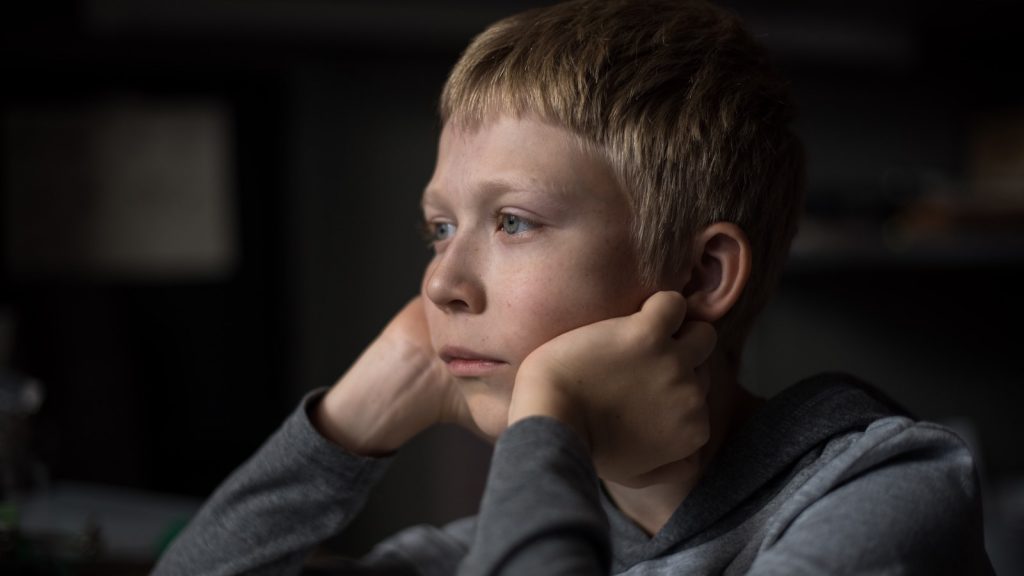Reviewed by Lee Hill
For international audiences, Andrey Zvyagintsev is THE Russian director in the way that Andrei Tarkovsky was in the 80s. Since his astonishing debut in 2003, The Return, he has found a way to combine portraits of individuals in crisis with wider examinations of Russia’s inability to move away from totalitarianism. In his last two films, Elena (2011) and Leviathan (2014), relationships between men and women are severely disrupted if not shattered by the social, economic and political dysfunction of Putin’s Russia. Zvyagintsev views the citizens of his fractured homeland not just with the eye of a poet, but a clinician’s knack for making sense of the fragments and the grim reflections of what is left.
Loveless, which won a Jury Prize at Cannes and a well-deserved Oscar nomination for Best Foreign Film, is both timeless and timely in its concerns. It depicts a bullishly self-confident modern Moscow, with news of Russia’s military intervention in the Ukraine adding to the aggressive tension. As his unhappy parents, Zhenya and Boris, argue during divorce proceedings, their 12-year-old son, Alexey, wanders off one day after school and disappears. So consumed are the parents by their respective dreams of domestic escape (and affairs), they don’t notice their son’s absence until the trail starts to fade. The police also bungle the search by assuming Alexey has merely run away for a few days. Days grow into weeks and the divided parents and authorities assume the worst. While their concern for their missing child seems genuine, they are distracted by demanding new relationships, office politics (Zvyagintsev has probably cornered the market on the creepiest company canteen ever filmed) and a need to assert their grip on the next rung up the slippery ladder of the new Russian class system.

If Loveless has an older brother, it is Michelangelo Antonioni’s magisterial L’Avventura (1960), in which the disappearance of a young upper middle-class woman during a boating trip soon takes second place to a complicated affair between the woman’s lover and her best friend. As in Antonioni’s film, a character’s absence becomes a catalyst for a broader social critique. L’Avventura is primarily about the ways contentment and love can so easily mutate into unhappiness and resentment and that perhaps alienation is the price we pay for modern freedoms and comforts. In Loveless, the oppressiveness of a state that defines personal freedom in purely material terms has deadened communities to pursue little beyond their own self-interest.
Zvyaginstev is now working at such a high level of ambition – a formal and thematic complexity that brings him closer to not only giants like Tarkovsky and Antonioni, but the recent peaks achieved by Kieslowski and Haneke, that some might find Loveless a let down from the Tolstoyan sweep of Leviathan. Leviathan showed how lawless the state was the further it was from the cos-mopolitan sprawl of Moscow or St. Petersburg. In Loveless, the state’s brand of justice has merely resurrected the inequalities of the Tsarist period and given the new middle-class a glib sense of entitlement, but little security or community.

Hauntingly photographed by regular collaborator, Mikhail Krichman, Loveless’ bitter study of personal and political stasis is impeccably cast. As the parents, Maryana Spivak and Aleksey Rozin, show individuals who are not uncaring so much as tragically distracted by the illusory potential of a life with more successful and attractive partners. And as the missing Alexey, in his brief but powerful screen time, Matvey Novikov, embodies not just the father who will never become child to the man, but a state that is unlikely to give birth to the utopianism of another Revolution.
Director: Andrey Zvyagintsev
Writers: Oleg Negin, Andrey Zvyagintsev
Stars: Maryana Spivak, Aleksey Rozin, Matvey Novikov
